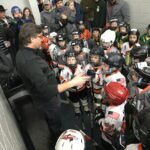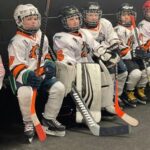This page and section of our website is filled with team resources, rules, procedures, and more to help everyone navigate the season.
Please scroll through the page and look through the menu under the resources tab to find the information you are seeking
![[EDOPHOTO]-66439759 [EDOPHOTO]-66439759](https://kvhockey.org/wp-content/uploads/sites/374/2023/06/EDOPHOTO-66439759-300x225.png)
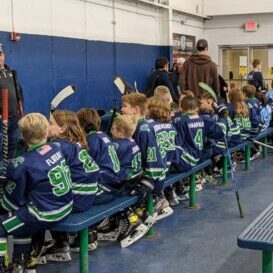
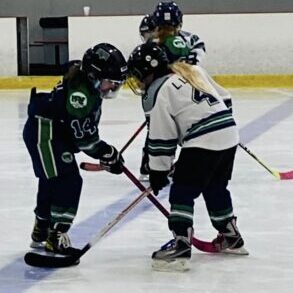
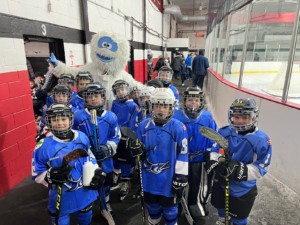
If a player and/or a coach receives a GAME MISCONDUCT penalty, the team should upload a copy of the scoresheet from the game the penalty was incurred, as well as the subsequent scoresheets showing that the game(s) was/were served.
If a player and/or a coach receives a MATCH penalty, the team needs to immediately notify KVHA, who will then notify the MAHA District 4 Chair. The MAHA Chair will review the incident report and notify the player's parent of the next steps. If warranted, MAHA will ask the coach or association for additional information to conduct an investigation. Match penalties do not always trigger a hearing. If the infraction falls under the standardized discipline rule, this allows the district chair to assess discipline. Once the discipline is assessed, the findings/results will be sent to the player/family and they have a right to request a hearing or accept the disciplinary action assessed. the decision may be appealed but the player may not resume until all proceedings have taken place and a decision has been rendered.
You can upload a copy of your scoresheets here: KVHA Scoresheet Collector - Formstack. Scoresheets can also be scanned and emailed, copied and dropped in the KVHA Mailbox at KV Brighton
's score sheet showing that the assessed player or coach did indeed sit out. Be sure to note clearly on that game's score sheet that the player (name & number) or coach is serving the game misconduct from (date of the game when they were assessed). Do not write this on the scoresheet label, write it in the notes section or an area that will copy to the other two sheets.
DISCIPLINARY ACTIONS & PENALTY PROGRESSIONS
The following circumstances deal with the most common disciplinary actions that have come before the District 4 Council in recent years. These are not inclusive. Refer to Section XVI of the M.A.H.A. Annual Guide for the complete list.
- It is the responsibility of the Head Coach to review the game scoresheet, after signature by the game officials, for any Game Misconduct or Match penalties. The Head Coach is responsible to take any necessary action based on the scoresheet review. If the Head Coach is not at the game, the acting Head Coach and/or Team Manager are responsible.
- All Match penalties must be reported by the Head Coach (team staff member in his absence) within (24) hours following the incident to the District Council Chairperson in the District where the team is registered. Violation of this rule may result in additional suspension of the team official.
- A player, or team official, receiving a Match Penalty is automatically suspended from all amateur hockey activities (including practices and off-ice team activities) until a decision is rendered under the standardized discipline policy or until a hearing is held by the District Council.
- A coach or manager, upon the findings of the District Council, who knowingly allowed the participation of an ineligible player or coach in any game shall be subject to a recommended suspension of not less than one year. A player or coach receiving a game misconduct is ineligible to participate in the next game. Not sitting out the next game, and noting that on the scoresheet, will constitute allowing the participation of an ineligible player or coach.
- A player, upon the findings of the District Council, who knowingly participated in a game as an ineligible player, shall be suspended for not less than thirty (30) days. A player receiving a game misconduct is ineligible to play the next game. Not sitting out the next game will constitute participating as an ineligible player.
- If, as the result of a hearing, the allegation of deliberate assault on a game official (referee, linesman, official scorekeepers, game timekeepers, penalty timekeepers, goal judges, statisticians, and public address announcers) is sustained , the player or team official shall be suspended for a minimum period of one (1) year, followed by probation for a period to be determined by the District Council.
- When a player, coach, or manager receives a game suspension(s), he/she shall not be eligible to participate in the next game(s) that were already on the schedule of that team before the incident occurs. (The reason for this change is to stop a team from scheduling a “midnight game”, real or phantom, to circumvent the suspension.)
- Head Coaches are also responsible for compliance with Rule 411- Progressive Suspensions. Rule 411 increases game suspensions to a player who receives their third and subsequent major penalties for infractions classified as “Aggressive Infractions” during the same season. It also adds a suspension to the head coach for a team receiving three major penalties in the same game.
- Conduct “detrimental to hockey”: Any other conduct that is not in the best interest of promoting the mission and purposes of amateur hockey, that is brought to the attention of the District Council, will be investigated. A subsequent hearing will be conducted if warranted by the information gathered during the investigation. (Reference M.A.H.A. Annual Guide: section XVI, Disciplinary Actions.)
More information - https://kvhockey.org/penalties/
USA Hockey SafeSport is the organization's program related to off-ice safety. USA Hockey has long had systems in place to protect its participants from physical abuse, sexual abuse and other types of abuse and misconduct that can be harmful to youth hockey players and other participants. These include without limitation Physical Abuse, Sexual Abuse, Screening, Locker Room Supervision and Hazing Policies, in addition to Codes of Conduct applicable to administrators, coaches, officials, parents, players and spectators.
The USA Hockey SafeSport Handbook is intended to update and collect USA Hockey’s various policies to protect its participants from all types of misconduct and abuse. Please review the Safesport materials. Parents are encouraged to watch the training module.
Should an incident occur, you can file an incident report by clicking the link provided. SAFESPORT WILL TAKE ANONYMOUS REPORTS
USA HOCKEY SAFESPORT INCIDENT REPORTING TOOL & MORE INFO
SAFESPORT TRAINING FOR COACHES, MANAGER AND LOCKER ROOM MONITORS
Beginning in the 2017-18 season, MAHA required that all coaches, managers and locker room monitors complete SafeSport Training at no cost in order to be placed on an official roster or serve in other team roles.
As of June 2019, USA Hockey updated requirements for Safesport to include players who are 18 years old, or who will be turning 18 during the season. Those players must complete the Safesport training BEFORE they can be rostered.
Coaches, Managers, and Locker Room Monitors are also now required to take Safesport training every year
The online course will now be called “Core Center for SafeSport Training,” and generally takes approximately 90 – 120 minutes to complete. “Refresher Courses” are available each subsequent year for those who have completed the Core Center for SafeSport Training. The Refreshers takes 30 minutes to complete
State by State Mandatory Reporter Information
Safesport Quick Reference on Bullying
Safesport Quick Reference on Locker Room Monitoring
Safesport Quick Reference for Coaches
USAHOCKEY SAFESPORT RESOURCES AND TOOLS
Due to the size of Kensington Valley Hockey Association (KVHA) and the diversity of its Members, KVHA recognizes that from time to time certain incidents may occur that result in a dispute, disagreement, or misunderstanding (referred to as “Grievances”) among Members.
It is the intent of the KVHA Board of Directors to provide an opportunity for members (coaches, parents, players) to express their concerns and receive a timely and appropriate response. In order to ensure a respectful and professional experience, the Board insists that coaches, parents, players and board members follow the Grievance Procedures as outlined below
The Grievance Procedures are a series of escalating steps. Members desiring to file a Grievance must adhere to these procedures, in proper order, so that Grievances may be resolved fairly and consistently. Failure to follow these steps may result in an invalid Grievance that may not be reviewed. The specific steps are as follows:
- Cooling off period (24 hours): There are to be no spontaneous grievance related conversations immediately following a game or practice. Players and parents agree to wait at least 24 hours after a game or practice prior to initiating a conversation with a coach, ace coordinator, or board member. Coaches, ace coordinators, and board members agree to not participate in any conversations where the grievance procedure has not been followed.
- Grievance form: Prior to any conversations being held between a parent, coach, ace coordinator, or board member the KVHA Grievance Submission form must be completed either electronically below, or download and complete the form below and email it back to discipline@kvhockey.org
- The President or Vice President or Hockey Director will be responsible for delivering the form to the appropriate party (coach, ace coordinator, or board member) to which the grievance is being submitted. This will allow all implicated parties (the coach, ace coordinator or board member, etc.) the opportunity to be prepared to discuss the issue.
- Complainant must properly file the Submission Form within fifteen (15) days after the Grievance Incident occurs, or the Grievance will not be reviewed.
- The President or Vice President or Hockey Director will confirm receipt of the Submission Form and assign the Grievance Submission a number.
- Initial Meeting: The party against whom the grievance is filed will contact the complainant to arrange a time to meet and meet with all relevant/implicated parties in order to resolve the issue. The coach, ace coordinator, or board member will contact the complainant to arrange a time to meet with the parent and player (if appropriate) in order to resolve the issue. All parties are required to and agree to conduct themselves professionally and respectfully at all times.
- President, Vice President or Hockey Director Involvement: In the event the issue is not resolved to the satisfaction of the parties (parent, coach, ace coordinator or board member:
- The President, Vice President or Hockey Director will review the Submission Form and conduct an investigation of the Grievance to the extent that he/she/they can to fully understand the Grievance described in the Submission Form.
- Upon completing the investigation, the President, Vice President or Hockey Director may try and resolve the Grievance in any manner that he/she/they believe(s)s is in the best interest of all parties involved with the Grievance.
- The President, Vice President or Hockey Director may request a meeting with the parties involved in order to resolve the issue.
- Decisions/Resolutions: If the President, Vice President or Hockey Director makes an independent decision/resolution regarding the Grievance, then that decision/resolution will be communicated to Complainant and any other parties involved in the Grievance. The Grievance and its resolution will be reported to the KVHA Board of Directors as a matter of course in the regular monthly meetings. The Grievance will then be deemed closed.
Appeal Process:
If Complainant is not satisfied with the decision/resolution of the President, Vice President or Hockey Director, then Complainant may appeal the decision/resolution by completing the KVHA Grievance Appeal Form (Form is available on the Board Page @ www.kvhockey.org website), and emailing the Appeal Form to the President at president@kvhockey.org. This Appeal will be considered an Article VII, section 4 Grievance pursuant to the KVHA By-laws.
- Complainant's appeal must be filed within seven (7) days after the President, Vice President or Hockey Director communicates the decision/resolution to Complainant.
- If Complainant fails to file a timely Appeal Form, then the President or Vice President may, in his or her discretion, decide that the President, Vice President or Hockey Director’s decision/resolution will stand without reviewing or considering the Appeal Form.
- All involved parties will either be invited to attend the next regularly scheduled KVHA Board of Directors meeting and present their case ora separate hearing will be arranged within two weeks after the receipt of the Grievance Appeal form. Notification of the decision will be made no later than two weeks after the Board of Director’s meeting or hearing.
Grievance Committee (“GC”):
- In the event the issue is not resolved, and a Grievance Committee has been formed, the President Vice President will bring the grievance to said Committee. The GC may schedule a meeting with the Complainant.
- The Committee has the authority to make decisions/resolutions with respect to any Grievance referred to the Grievance Committee and the authority to communicate those decisions/resolutions to Complainant and to any other parties involved in the Grievance.
- The President may then disseminate the decision/resolution of the GC to the KVHA Board of Directors.
- Any decision/resolution of the GC is final and is not subject to further appeal.
Conclusion
The Grievance Procedures were written to provide for a governing structure with respect to responding to a Grievance so that the President, Vice President and Hockey Director, the KVHA Board of Directors and the Grievance Committee may as reasonably and as quickly as possible to deal with a variety of Grievances that will arise from time to time. Should a Member have any questions regarding Grievance Procedures, please contact the Vice President discipline@kvhockey.org

